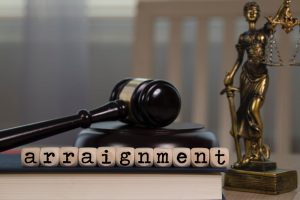 Your first appearance before the judge in a criminal defense case is called an arraignment. As a defendant, you have a constitutional right to hear the charges the state has filed against you, and the arraignment serves this purpose. Because this court appearance usually happens shortly after the arrest, you will probably feel overwhelmed. Knowing what happens at an arraignment will help you understand your rights and obligations.
Your first appearance before the judge in a criminal defense case is called an arraignment. As a defendant, you have a constitutional right to hear the charges the state has filed against you, and the arraignment serves this purpose. Because this court appearance usually happens shortly after the arrest, you will probably feel overwhelmed. Knowing what happens at an arraignment will help you understand your rights and obligations.
The Court Will Inform You of Your Charges
No defendant can face indefinite detention without being informed of what charges they are facing. For this reason, you will have your arraignment early in your case. Under the Federal Rules of Civil Procedure, the judge must read your charges aloud to you unless you waive the reading through your attorney. However, if the prosecution learns new information at later stages of their investigation, they may still charge you with additional crimes.
You Will Enter Your Plea
After you learn the charges against you, you will have an opportunity to enter your plea. In all likelihood, you will enter a not-guilty plea. If you plead guilty, the judge can sentence you immediately. Pleading not guilty will allow the case to move on to its next stage, often the preliminary hearing, where you can begin to fight the charges if you wish. Alternatively, you can negotiate lesser charges or a lighter sentence with the prosecutor.
The Judge Will Decide Whether to Grant Bail
After you enter your plea, the judge will decide whether and on what terms you can be released on bail. They will decide after considering:
- Whether you have local family ties
- Your personal resources and capacity to flee
- Whether you present any danger to the community
- Any previous criminal history you may have
- Whether you have forfeited bail or violated conditions of release before
If the charges are not particularly severe and you pose no danger to other people, the judge may decide to release you on your own recognizance. If so, you can get out of jail without paying a bond until sentencing. Otherwise, the judge may set a bail amount.
In addition to considering how much bail you must pay, the judge may also lay out conditions for your release.
The Court May Take You into Custody
If the judge decides against granting bail, they will order you to be taken into custody. However, you still have the right to argue why you should remain free while your trial is pending. Because of that right, you will later receive an opportunity to have a bail hearing where you can challenge the judge’s decision.
The Court Will Inform You of Your Right to an Attorney
If you do not already have a lawyer for your trial, the court will inform you of your legal right to counsel at the arraignment. However, arraignments sometimes follow a preliminary hearing, so some defendants will already have retained a lawyer’s services by the time the arraignment occurs. Regardless, you will benefit immensely from having an attorney as early as possible.
The Importance of Having an Attorney at the Arraignment
If your arraignment is the first time you appear in court, you will probably be feeling overwhelmed. Having an attorney for your first appearance before a judge can reduce some of the stress. Your lawyer can also help you present yourself in a way that will minimize your risk of making a negative impression on the court.
Furthermore, your lawyer can fight for your best interests when the judge sets the conditions for your release. Judges can often be harsher than necessary with the conditions they set, often making it impossible for you to attend work or your place of worship. Your attorney can argue a strong case for why the judge should consider less restrictive conditions.
Contact an Experienced Milwaukee Criminal Defense Attorney Today
If you have recently learned that you are under criminal investigation or if you have been arrested, time is of the essence. Prosecutors have all the resources of the state behind them, and they will work quickly to try to convict you and subject you to the harshest possible penalties. You need an experienced attorney on your side who can defend your rights and liberties.
The skilled and knowledgeable Milwaukee criminal defense lawyers of Hart Powell, S.C. are committed to fighting for people who have been charged with crimes. We will be with you every step of the way, including your arraignment, to optimize your chances of a favorable outcome. Call us today at (414) 271-9595 or contact us online for a confidential consultation to find out more about how we can help you.
Related Posts:
